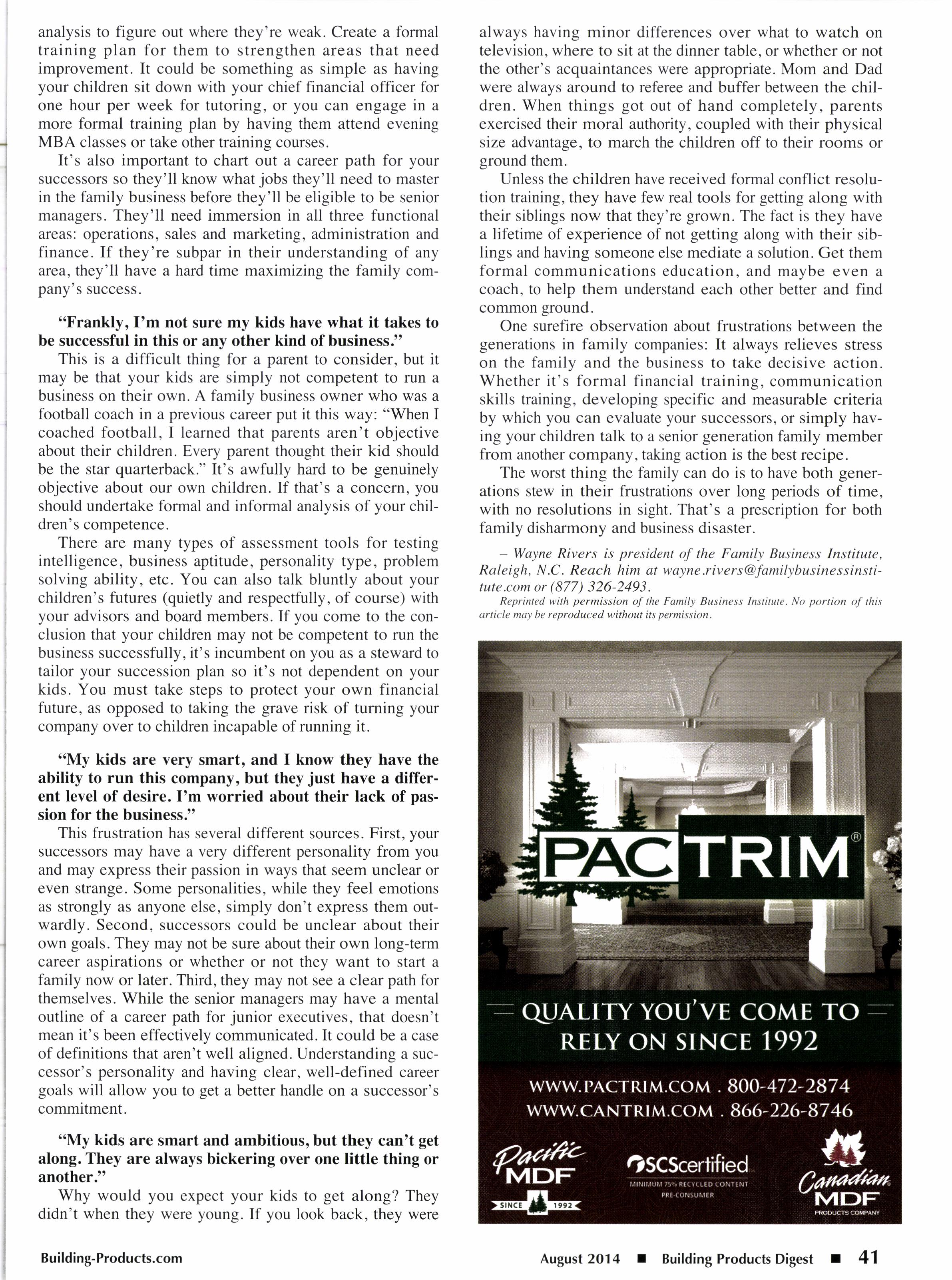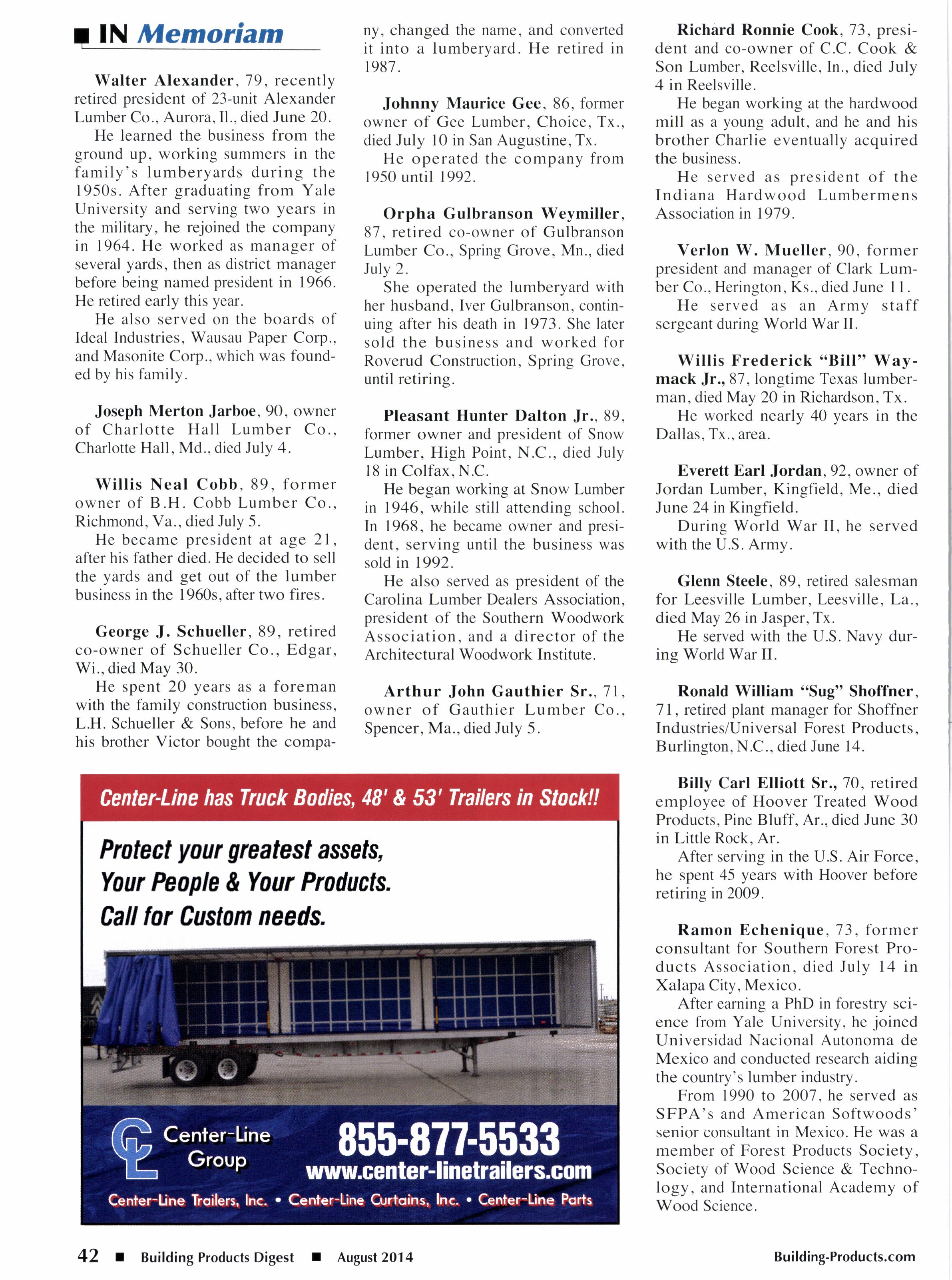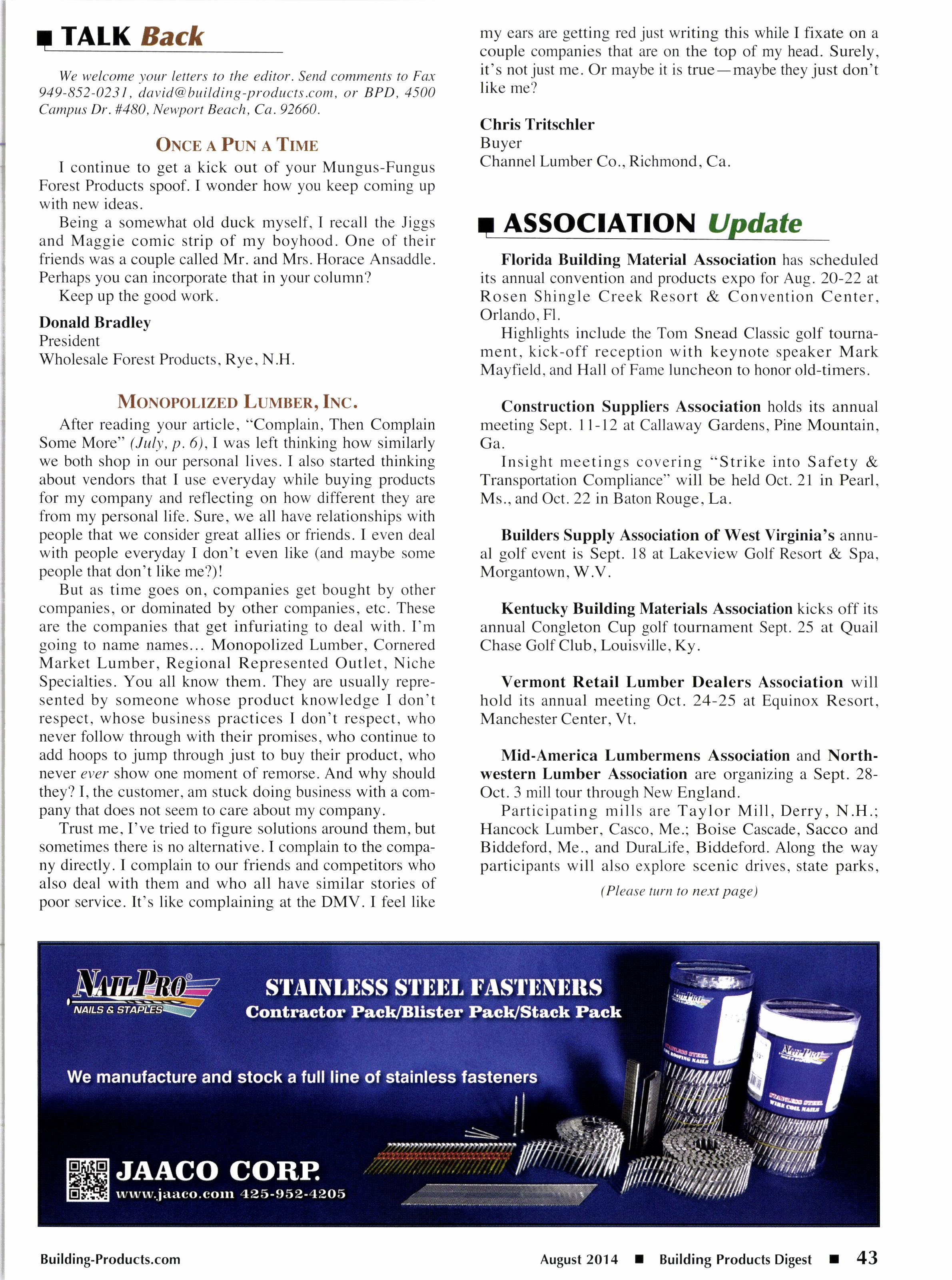
10 minute read
Are you frustrated with the younger gene ratio n?
expected to hang around an additional 20 or 30 hours. If they're coming up short in their job performance, you'll have objective criteria for evaluation and corrective action.
Second, help your kids understand your position by exposing them to senior generation peers in a different family business. We're not suggesting you send them there for employment, just talk. Hearing the perspective of other senior generation family business leaders could be valuable in opening the eyes of your children so they can understand the kind of work effort it truly takes to manage a thriving, growing enterprise.
ll [nNv sENroR generation family IYlbusiness members report that they're frustrated, even disillusioned, with their potential successors. They say their successors just don't seem to have the necessary levels of commitment to the business, and don't appear to be inclined to learn all the things they need to know. In comparison to the senior generation, they're lazy and disinterested in learning or coaching.
When young people agree to join their parents or grandparents in the family enterprise, they may or may not rcalize that in doing so they're immediately 1007o vested with the hopes, fears, and aspirations of the senior generation. They become the foundation upon which the legacy of both the family and the business will be constructed. That increases the pressures the senior generations feel when they begin to consider backing off and slowing down. Let's take a quick look at some of the common frustrations family business parents feel and, more importantly, what to do about them.
"My kids don't seem to have the same work ethic I did when I started out. They're just not willing to put in the hours necessary."
Today's young people definitely have a different view of the amount of work hours it takes to be successful in business. This lament is almost universal in family enterprises when the generation gap becomes apparent. There is a different societal norm for today's 3O-something family business executive. They are expected to be every bit as dedicated as their parents were, while simultaneously being expected to be at every dance recital, Little League game, and school pageant. They also expected to help out around the house with the children, the chores, the car pooling, etc.
Here are two simple suggestions.
First, develop the measurable, or metrics, by which you'll evaluate your successors in theirjobs. If they can get all the requirements of their jobs done at an acceptable level in 40 hours a week, they shouldn't necessarily be
Senior generation family business members must understand that it's a different day. Today's spouses won't tolerate husbands or wives who are workaholics and rarely participate in normal, everyday family activities. This is already apparent to some family business leaders. One commented that he was tom between his desire for his son to be in the office 80 hours a week and wanting him to be at home taking care of the grandchildren. By virtue of the amazing amount of hours and hard work you put in, your kids may not have to work as hard as you did. That's a part of your gift and legacy to them.
"My kids just don't seem to get it. They understand the operations side of the business, but they have no clue about the financials and the needs for a healthy balance between customer fulfillment and the bottom line."
This frustration could stem from a simple lack of training or low skills development. The first step for improvement is to give your kids a skills assessment. or engage in gap analysis to figure out where they're weak. Create a formal training plan for them to strengthen areas that need improvement. It could be something as simple as having your children sit down with your chief financial officer for one hour per week for tutoring, or you can engage in a more formal training plan by having them attend evening MBA classes or take other training courses.
It's also important to chart out a career path for your successors so they'll know what jobs they'll need to master in the family business before they'll be eligible to be senior managers. They'll need immersion in all three functional areas: operations, sales and marketing, administration and finance. If they're subpar in their understanding of any area, they'll have a hard time maximizing the family company's success.
"Frankly, I'm not sure my kids have what it takes to be successful in this or any other kind of business."
This is a difficult thing for a parent to consider, but it may be that your kids are simply not competent to run a business on their own. A family business owner who was a football coach in a previous career put it this way: "When I coached football, I learned that parents aren't objective about their children. Every parent thought their kid should be the star quarterback." It's awfully hard to be genuinely objective about our own children. If that's a concern, you should undertake formal and informal analysis of your children's competence.
There are many types of assessment tools for testing intelligence, business aptitude, personality type, problem solving ability, etc. You can also talk bluntly about your children's futures (quietly and respectfully, of course) with your advisors and board members. If you come to the conclusion that your children may not be competent to run the business successfully, it's incumbent on you as a steward to tailor your succession plan so it's not dependent on your kids. You must take steps to protect your own financial future, as opposed to taking the grave risk of turning your company over to children incapable of running it.
"My kids are very smart, and I know they have the ability to run this company, but they just have a different level of desire. I'm worried about their lack of passion for the business.tt
This frustration has several different sources. First, your successors may have a very different personality from you and may express their passion in ways that seem unclear or even strange. Some personalities, while they feel emotions as strongly as anyone else, simply don't express them outwardly. Second, successors could be unclear about their own goals. They may not be sure about their own long-term career aspirations or whether or not they want to start a family now or later. Third, they may not see a clear path for themselves. While the senior managers may have a mental outline of a career path for junior executives, that doesn't mean it's been effectively communicated. It could be a case of definitions that aren't well aligned. Understanding a successor's personality and having clear, well-defined career goals will allow you to get a better handle on a successor's commitment.
"My kids are smart and ambitious, but they can't get along. They are always bickering over one little thing or another.tt
Why would you expect your kids to get along? They didn't when they were young. If you look back, they were Building-Products.com always having minor differences over what to watch on television, where to sit at the dinner table, or whether or not the other's acquaintances were appropriate. Mom and Dad were always around to referee and buffer between the children. When things got out of hand completely, parents exercised their moral authority, coupled with their physical size advantage, to march the children off to their rooms or ground them.
Unless the children have received formal conflict resolution training, they have few real tools for getting along with their siblings now that they're grown. The fact is they have a lifetime of experience of not getting along with their siblings and having someone else mediate a solution. Get them formal communications education, and maybe even a coach, to help them understand each other better and find common ground.
One surefire observation about frustrations between the generations in family companies: It always relieves stress on the family and the business to take decisive action. Whether it's formal financial training, communication skills training, developing specific and measurable criteria by which you can evaluate your successors, or simply having your children talk to a senior generation family member from another company, taking action is the best recipe.

The worst thing the family can do is to have both generations stew in their frustrations over long periods of time, with no resolutions in sight. That's a prescription for both family disharmony and business disaster.
Wayne Rivers is president of the Family Business Institute, Raleigh, N.C. Reach him at wayne.rivers@familybusinessinstitute.com or (877) 326-2493.
Walter Alexander, 79, recently retired president of 23-unit Alexander Lumber Co., Aurora, Il., died June 20.
He learned the business from the ground up, working summers in the family's lumberyards during the 1950s. After graduating from Yale University and serving two years in the military, he rejoined the company in 1964. He worked as manager of several yards, then as district manager before being named president in 1966. He retired early this year.
He also served on the boards of Ideal Industries, Wausau Paper Corp., and Masonite Corp., which was founded by his family.
Joseph Merton Jarboe, 90, owner of Charlotte Hall Lumber Co., Charlotte Hall, Md., died July 4.
Willis Neal Cobb. 89. former owner of B.H. Cobb Lumber Co.. Richmond, Va., died July 5.
He became president at age 21 , after his father died. He decided to sell the yards and get out of the lumber business in the 1960s, after two fires.
George J. Schueller, 89, retired co-owner of Schueller Co., Edgar, Wi., died May 30.
He spent 20 years as a foreman with the family construction business, L.H. Schueller & Sons. before he and his brother Victor bought the compa- ny, changed the name, and converted it into a lumberyard. He retired in 1987
Johnny Maurice Gee, 86, former owner of Gee Lumber, Choice, Tx., died July l0 in San Augustine, Tx.

He operated the company from 1950 until 1992.
Orpha Gulbranson Weymiller, 87. retired co-owner of Gulbranson Lumber Co., Spring Grove, Mn., died July 2.
She operated the lumberyard with her husband, Iver Gulbranson, continuing after his death in 1973. She later sold the business and worked for Roverud Construction, Spring Grove, until retiring.
Pleasant Hunter Dalton Jr., 89, former owner and president of Snow Lumber, High Point, N.C., died July l8 in Colfax, N.C.
He began working at Snow Lumber in 1946, while still attending school. In 1968, he became owner and president, serving until the business was sold in 1992.
He also served as president of the Carolina Lumber Dealers Association, president of the Southern Woodwork Association, and a director of the Architectural Woodwork Institute.
Arthur John Gauthier Sr.,71, owner of Gauthier Lumber Co., Spencer, Ma., died July 5.
Richard Ronnie Cook, 73, president and co-owner of C.C. Cook & Son Lumber, Reelsville, In., died July 4 in Reelsville.
He began working at the hardwood mill as a young adult, and he and his brother Charlie eventually acquired the business.
He served as president of the Indiana Hardwood Lumbermens Association in 1979.
Verlon W. Mueller. 90. former president and manager of Clark Lumber Co., Herington, Ks., died June I I
He served as an Army staff sergeant during World War IL
Willis Frederick "Bill" Waymack Jr.,87, longtime Texas lumberman, died May 2O in Richardson, Tx.
He worked nearly 40 years in the Dallas, Tx., area.
Everett Earl Jordan, 92, owner of Jordan Lumber, Kingfield, Me., died June 24 in Kingfield.
During World War II, he served with the u.S. Army.
Glenn Steele. 89. retired salesman for Leesville Lumber, Leesville, La., died May 26 in Jasper, Tx.
He served with the U.S. Navv during World War II.
Ronald William "Sug" Shoffner, 71 , retired plant manager for Shoffner Industries/Universal Forest Products, Burlington, N.C., died June 14.
Billy Carl Elliott Sr., 70, retired employee of Hoover Treated Wood Products, Pine Bluff, Ar., died June 30 in Little Rock. Ar.
After serving in the U.S. Air Force, he spent 45 years with Hoover before retiring in2009.
Ramon Echenique, 73, former consultant for Southern Forest Products Association, died July 14 in Xalapa City, Mexico.
After earning a PhD in forestry science from Yale University, he joined Universidad Nacional Autonoma de Mexico and conducted research aiding the country's lumber industry.
From 1990 to 2007, he served as SFPA's and American Softwoods' senior consultant in Mexico. He was a member of Forest Products Society, Society of Wood Science & Technology, and International Academy of Wood Science.
We welcome your letters to the editor. Send comments to Fax 949-852-023 I , david@building-products.com, or BPD, 4500 Campus Dr. #480, Newport Beach, Ca.92660.

OncTAPUNATTME
I continue to get a kick out of your Mungus-Fungus Forest Products spoof. I wonder how you keep coming up with new ideas.
Being a somewhat old duck myself, I recall the Jiggs and Maggie comic strip of my boyhood. One of their friends was a couple called Mr. and Mrs. Horace Ansaddle. Perhaps you can incorporate that in your column?
Keep up the good work.
Donald Bradley President Wholesale Forest Products, Rye, N.H.
MoNopor,rznD LUMBER, INC.
After reading your article, "Complain, Then Complain Some More" (July, p.6),I was left thinking how similarly we both shop in our personal lives. I also started thinking about vendors that I use everyday while buying products for my company and reflecting on how different they are from my personal life. Sure, we all have relationships with people that we consider great allies or friends. I even deal with people everyday I don't even like (and maybe some people that don't like me?)!
But as time goes on, companies get bought by other companies, or dominated by other companies, etc. These are the companies that get infuriating to deal with. I'm going to name names... Monopolized Lumber, Cornered Market Lumber, Regional Represented Outlet, Niche Specialties. You all know them. They are usually represented by someone whose product knowledge I don't respect, whose business practices I don't respect, who never follow through with their promises, who continue to add hoops to jump through just to buy their product, who never ever show one moment of remorse. And why should they? I, the customer, am stuck doing business with a company that does not seem to care about my company.
Trust me, I've tried to figure solutions around them, but sometimes there is no alternative. I complain to the company directly.I complain to our friends and competitors who also deal with them and who all have similar stories of poor service. It's like complaining at the DMV. I feel like my ears are getting red just writing this while I fixate on a couple companies that are on the top of my head. Surely, it's not just me. Or maybe it is true-maybe they just don't like me?
Chris Tritschler Buyer
Channel Lumber Co., Richmond, Ca.










